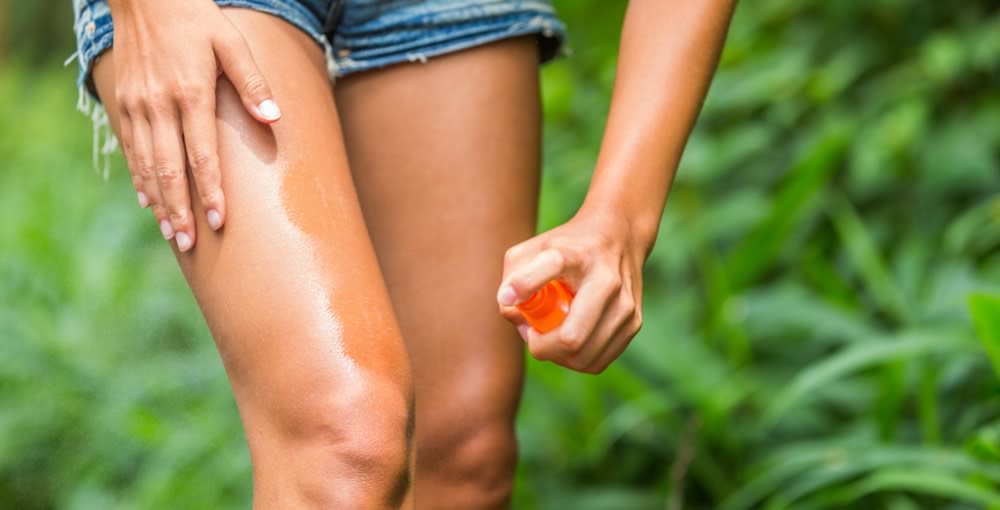What to do when summer bugs bite
June 19, 2019

Outdoor activities abound in the summer.
If you are heading out to the lake, beach, on camping trip or to a cookout at your neighbors, more likely than not, you will likely have a run-in with some of summer’s creepy crawlies.
Below are a few common summer time pests and first-aid tips that can take the sting out of sharing outdoor space with insects.
Yellow jackets, wasps, and honey bee stings
Being stung by a yellow jacket or a wasp can be extremely painful. Unlike bees, which can only sting once when they inject their stinger into you, yellow jackets and wasps can sting multiple times.
To treat a sting, remove any stingers and wash the area with soap and water to remove venom. Use a cold pack to ease the swelling and pain. Consider taking an over-the-counter antihistamine like Benadryl, which can also reduce our bodies natural histamine reaction that causes the swelling and itching.
Home remedies that do a great job in reducing swelling and pain include baking soda and vinegar. Create a baking soda paste by mixing a small of amount of baking soda and water. Apply to the sting area. Baking soda counteracts the acidic venom from wasps, yellow jackets and bees. Applying a small amount of vinegar to a cotton ball and dabbing the sting can also reduce itching.
Ticks
Ticks are active in the summer months, and if you are spending a lot of time in wooded areas or forests, it’s best to check you and your family for ticks regularly. A tick bite is often harmless, but once detected, you need to remove the tick immediately.
To remove a tick, use tweezers to get as close to the skin as possible. Slowly and gently pull the tick from the skin, assuring you have removed its head from the skin. Wash the area with soap and water.
As there are several tick-borne diseases that require treatment with antibiotics, it’s beneficial to identify what type of tick has bit you. You can learn about tick species and tick borne diseases at https://www.cdc.gov/ticks/tickbornediseases/tickID.html.
Seek medical treatment if you begin to experience flu-like symptoms or have developed a rash around the area where you were bitten by the tick. Rapid treatment greatly increases the chance of full recovery.
Spiders
There are roughly 3,000 different types of spiders in the US, and the majority aren’t poisonous. Plus, spider’s fangs are often too small or weak to puncture human skin.
Most of the time, you won’t even know that you have been bitten by a spider.
A spider bite creates a red swollen bump much like a bee sting or mosquito bite but is larger in diameter. Treatment is the same as a bee sting. Wash area with soap and water, use a baking soda paste to reduce pain and inflammation, vinegar cotton balls to reduce itching, or take an over-the-counter antihistamine. Symptoms should resolve in a week.
According to the Texas Department of State Health Services, there are two venomous spiders in Texas: Brown Recluse and Black Widow. Both of these spiders are not aggressive, but will bite when accidentally trapped, disturbed or threatened.
So, how do you know if you have been bitten by one of these venomous spiders?
It depends on age and amount of venom injected by the spider, but if you begin experiencing abdominal pain, nausea, fever, chills, seek medical attention immediately. Brown recluse bites often have a red, white and blue lesion at the bite site, and possible necrosis, which is the death of cells in the skin.
If case of an emergency, carry an Epi-Pen.
Severe allergic reactions, or anaphylaxis, to bug bites and stings happen in about 3 percent of the U.S. population. Often times you won’t know if someone is severely allergic until they are bitten the first time.
That’s why carrying an Epi-Pen makes good sense, especially if you are with small children who have yet to be exposed.
Symptoms that occur with severe allergic reaction happen almost immediately after the bite or sting has occurred and up to 12 hours after.
Seek medical help immediately if symptoms include difficulty breathing, hives, tightness of the throat, nausea, vomiting, dizziness, fainting and cardiac arrest.
Even after using an Epi-Pen, physicians recommend heading to the emergency room to assure proper medical care.
Sources:
Center for Disease Control: https://www.cdc.gov/ticks/tickbornediseases/tickID.html
Texas Department of State Health Services: https://www.dshs.texas.gov/IDCU/health/zoonosis/animal/bites/information/venom/Spider.doc
American College of Allergy, Asthma and Immunology: https://acaai.org/allergies/anaphylaxis




